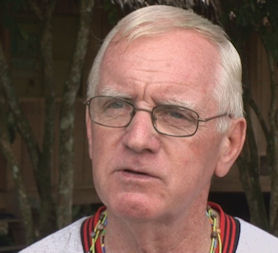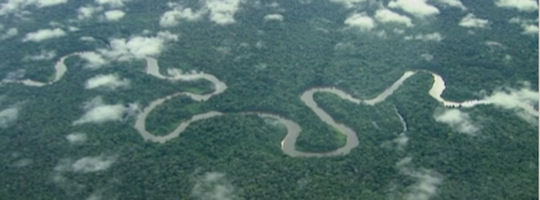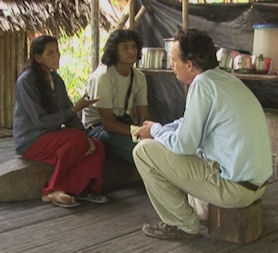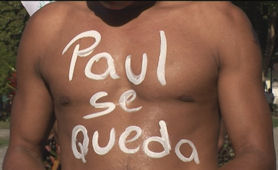Peru tries to expel ‘incendiary gringo priest’
Brother Paul McAuley is a hero among the indigenous tribes of the Peruvian Amazon. Following his campaign for tribal rights, Peru’s government has ordered his expulsion. Jonathan Rugman reports.

“If I have to go, I’ll get carried out,” he told me last week. “I won’t resist because I respect Peruvian law, but I won’t have the energy to take any steps to walk. That would be to betray these people.”
The Amazon basin is vast, stretching across nine South American countries, with Brazil housing the biggest slice of forest and Peru second. We begin our journey across it by flying from the shabby oil town of Iquitos in a little Cessna single propeller plane.
For the last decade, Brother Paul has made the jungle beneath us his home. A maze of muddy rivers meanders through the ecological wonder of the world. It’s a land of remote Indian tribes – victims, says Brother Paul, of a land grab by multinational oil companies and the Peruvian state.

We spot a cluster of thatched huts around a forest clearing and prepare to land. After a 90 minute flight which would have taken 15 days by boat. But our pilot has second thoughts – the Tigre River, which forms the only runway here, is too low. So we divert to a deeper stretch of water drifting lazily past another village.
A welcoming party from the Kichua people is on the river bank, apparently mystified by the sudden appearance of a gringo from the sky. Many of them can barely speak Spanish, let alone read or write. They live without electricity or running water, and if there had been a road to them I would have driven here instead.
It is easy to idealise their poverty; they harvest plantains and yucca or hunt the forest for deer and wild boar. But they complain that decades of drilling by oil companies has destroyed their once pristine river. Worse, children have died after drinking contaminated water.
Julia and Jose Chuje
Julia Chuje is from the neighbouring village of Remanente. She is a 55 year old mother of 12 – though seven of her children died, she says, by drinking poisoned water.
“They died by vomiting, just like that,” Julia told me. “They threw up a lot. First we thought it was the witches. We took them to other villages, and there they died, vomiting blood. We didn’t know about medicines or pills. Their livers started to swell up and then they died. It was all about the oil.”
I ask her the obvious question – how can she be sure it was the river water that killed her children?
“Even I drank the water and my liver started to ache,” she replies. “People told us to stop, and drink from the stream, and that’s when we got better.”
One of her surviving sons, Jose, is sitting beside her. Brother Paul McAuley helped get him out of jail where he says he was tortured, for protesting against the oil companies and the abuse of native human rights.
“I asked Paul to come so he could see and tell people about the way things are,” Jose said. “And he did come and people started to believe. They realised we had the right to fight against pollution, against poverty and for our way of life.”
‘They have profited, and left nothing for us’
I notice one villager wearing the bright orange boiler suit of an oil company, and so assume the industry has provided at least some jobs here. But the outfit had been picked up as a cast-off, presumably from the drilling platforms a couple of hours upstream by boat from here, and denotes no such employment.
“They have profited and they have left nothing for us,” claims Jorge Calderon, a 23 year old father of two. “We want an oil company that comes but leaves something for us. That shares something with us. It could be oil itself, because we don’t have it and have to sleep in the dark. Or it could be money for us to set up a health centre here.”

In the last few years, oil and gas exploration licenses have been sold off for 97 per cent of the Peruvian Amazon. That should make Peru rich, but the people who live here, the indigenous tribes, are increasingly concerned that they will not share in the benefits of this energy boom.
Peru’s Ministry of Health has admitted that drinking water has been contaminated in the past. The government’s line is that things have changed – that the industry is cleaner and comes to the Amazon proffering “impact assessments” and “stakeholder engagement”. The problem is that the Indians don’t trust the oilmen or the government supposedly supervising them.
I ask Julia Chuje if the authorities had compensated her for the loss of her seven children.
“I don’t know about the government, I don’t know what government IS,” she said simply. “I don’t know how to read or write. How can I report something if I don’t know anything?”
Peru in facts and figures
Size: 1,285,216 square kms
Population: 29,907,003 (July 2010 est)
GDP: $253bn (2009)
Currency: Nuevo Sol
28 July 1821: independence declared from Spain
President: Alan García Peréz
(Source: CIA World Factbook)
In April 2009, hundreds of Indians left the Amazon to join demonstrations in the mountains which officially left 24 policemen and 11 protesters dead, though indigenous groups say hundreds of civilians were killed.
“Listen!” they chanted in a message to Peru’s president. “The jungle is not for sale.”
And what worries the authorities about Brother Paul McAuley is that he is apparently encouraging Indians to fight back against Peru’s energy revolution, albeit through peaceful resistance.
“They have been informed that the petrol companies are coming in but they haven’t been consulted,” he says of the indigenous tribes. “And that’s where the weakness is.”
Brother Paul’s achievements
It was Brother Paul who in 2008 filmed video pictures of the River Tigre, blackened by clouds of billowing oil, and he has asked the Peruvian authorities to investigate.
And it was Brother Paul who in the same year obtained a chilling video – which he passed to Channel 4 News – of a man apparently tortured and killed after demonstrating for native rights.
“The death of the native has never been investigated,” he said. “We have been going on for two years and we know nothing about how he died.”
The Catholic missionary lists his main achievements as helping overturn possible 20 year jail sentences facing Indian protestors, and obliging the government to conduct environmental and social studies before forestry logging concessions are awarded; though he says Peru’s President, Alan Garcia, has refused to sign that pledge into law.
The Peruvian press has called Brother Paul a “white terrorist”, and an “incendiary gringo priest”, and the campaigning charity that Brother Paul founded is certainly causing a rumble in the jungle.
On the outskirts of Iquitos, the missionary manages a small village of Indian huts, housing forty people from 10 different Amazon tribes. The regional government, an enlightened oil company and a small group of British donors have helped fund it. Among them Willy Russell, the “Shirley Valentine” playwright, who has helped Brother Paul to the tune of around £10 000 over the years.
A voice for the Indians
Brother Paul’s idea is that the Indians can’t speak for themselves unless they are educated. And they can only do that if they study at university. And they only have any hope of that if somebody like him takes them in when they arrive in Iquitos from the jungle, often penniless and with nowhere to live.
So the students in this model village are learning forestry, medicine and law, in order to become advocates for their people. “The government thinks nobody lives inside the Amazon,” says Ruben Medina of the Huitoto tribe. “But we were here before the Republic existed, and we are always going to fight for our land.”
One large thatched hut serves as the venue for “town hall” style meetings, where the Indians make speeches about self-empowerment which would make Che Guevara proud.
“On 19 June there was a leak of crude oil, but nobody listens to us,” says Maria Lucia Canaquil, of the Cocama people. “They say we lie. But its the truth. I ask that our voices be heard and our rights respected. We will keep on fighting.”

Last week Brother Paul became a front page story in Peru, after the Prime Minister and Interior Minister threatened to cancel his residency permit, accusing him of breaching public order and acting against the state.
“We are the only group that works permanently on environmental education and the human rights of the natives in the middle of the forest,” he said. “And it seems that because we are well received by people, because they know we are playing a well balanced role, it seems the authorities don’t like that.”
Native groups responded with a day of street protests, backed by one of Peru’s biggest unions. Men stripped off their shirts and daubed the word “Paul” on their stomachs in black paint. They marched through Iquitos with a banner proclaiming the formation of the “Committee against the Expulsion of Brother Paul”.
The missionary’s model Indian village is now festooned with banners reading “Defending the life of the forest is not a crime” and “The spirit of the forest is with you, Brother Paul”.
“The state has forgotten us. In my village we don’t even know who the President is,” one of the villagers, Wilmer Cujichimba, told me. “We are very thankful for the foreign Brother who feels for us. That is why we are going to support him with all we have.”
Powerful friends
The missionary has powerful friends in the Catholic Church – one evening last week I watched him speak by telephone to an audience of some 600 Christian supporters, packed into a church in Lima, the Peruvian capital.
The head of McAuley’s Christian Order, the De La Salle Brothers based in Rome, is backing him. And the church has provided him with lawyers who have successfully obtained an injunction, granting him leave to appeal against his possible expulsion. Yesterday a judge ordered the government to stop harassing the missionary, though the case is expected to continue through the courts.
Though McAuley has been awarded an MBE by the Queen for services to Peruvian education, he hasn’t even bothered contacting the British Embassy in Peru, believing they will see him as nothing more than an embarrassment at a time when there is money to be made by foreign oil companies exploring the Amazon.
“I gave it away,” he says of the Queen’s medal. “I gave the medal to a group in Spain that was helping us.”
The governor of Peru’s Loreto state, who himself worked in the oil industry for eight years, insists that it is time for the Brother to go.
“He sometimes spoke very badly about our authorities, saying they were incompetent or not intelligent,” Edmundo Espiritu complains. “Many times he said we had sold out to American capitalism!”
“Maybe he HAS had a role in making people conscious about their rights,” the governor admitted. “But ten years in that mission is enough time to let people speak – without his help.”
Brother Paul is certainly an unorthodox Catholic. Three times he has drunk Ayahuasca, the juice from a forest vine known as the “Rope of Death” which sends Indians onto a psychedelic journey into what they believe is the future.
At the Ayahuasca session I attended with the missionary, sitting in a semi-circle on the floor of a hut after dark, one Indian had a vision of Brother Paul as a Polar bear with his white fur covered in oil, though the Brother was eventually washed clean.
“I am sure the spirit of the jungle is now with us,” he told me, describing how the drug once induced the sensation of roots of plants growing through his back. “The trees started to caress my arms and I felt part of nature. I took that as a sort of confirmation of what we are doing here.”
<!–
–>
-
Latest news
-
Laughing Boy: New play tells the tragic tale of Connor Sparrowhawk5m

-
Sewage warning system allows some of worst test results to be left off rating system, analysis shows3m

-
Post Office inquiry: Former CEO didn’t like word “bugs” to refer to faulty IT system4m

-
Israeli soldier speaks out on war in Gaza12m

-
PM’s defence spending boost should be ‘celebrated’, says former Armed Forces Minister4m

-




